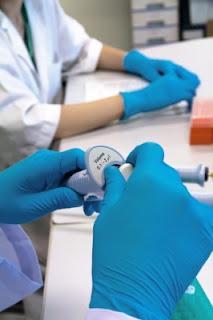Here's a situation that illustrates how fantastic medical advances don't always translate to patients benefiting in the clinic. For that to happen, the science needs to be carried along a pipeline of practitioner communication, all the way to the patient.
 |
| Cancer patients' fertility is in the hands of cooperating physicians. |
More women are surviving cancer. We know that some of the cancer treatments will leave them less fertile or even completely sterile. Fortunately, the assisted reproductive technology exists to help young women preserve their fertility for later use, post-cancer. But a new study in the journal Cancer says very few of these women take the steps to save their eggs or embryos before infertility-causing cancer treatment.
Of the 1,041 women sampled from the California Cancer Registry, ages 18 to 40 at time of diagnosis between the years 1991 and 2007, and who participated in the survey, only 4 percent underwent fertility preservation techniques.
One of the study's authors, Dr. Mitchell Rosen of California, cites a couple of reasons. One is cost. Another is the limited amount of related counseling that oncologists are providing to these frightened patients.
The good news is that more cancer doctors are informing their patients of the connections between cancer treatment and future infertility, partly due to guidelines instituted by the American Society of Clinical Oncology back in 2006. But just what constitutes adequate information is in question.
According to Rosen in this Huffington Post article, an oncologist may refer vaguely to the problem ('The treatment might affect your fertility, but let's figure out how we're going to go ahead and save your life') and "That brief sentence might be considered counseling..."
Another issue this study brings to light: it appears not every woman is equally informed, based on demographics like age, race, and even educational level. The article says:
"Those who had gone to college were 20 percent more likely to be counseled than those who had not.
Women who were childless, younger, white and heterosexual were also more likely to be told about the possible effects of cancer treatments on their ability to conceive."
In 2008, Houston Fertility Center published a website called BabyLater.com to inform the public that we offer a number of techniques for deferring conception by way of preserving fertility. The purpose of our website and my related outreach activities is to educate not only patients, but the abundance of professionals in the cancer care field here in Houston.
This Huffington Post article says a panel of recommendation experts is revising guidelines now, but they won't be made public for another year or more. The article also quotes Dr. Kutluk Oktay, co-chair of that expert panel, commenting on the current state of that crucial information pipeline: "On the cancer side, there's no official training for this."
Physicians on the front line of cancer treatment are holding the cards in terms of letting women know that they have choices, that they can save their ability to have children in the future. I will continue to do what I can to spread the good news, that not only is there very often life after cancer, but parenthood, too.
~ Dr. Sonja Kristiansen M.D.
“Racial, Socioeconomic, and Demographic Disparities in Access to Fertility Preservation in Young Women Diagnosed With Cancer.” Joseph M. Letourneau, James F. Smith, Erin E. Ebbel, Amaranta Craig, Patricia P. Katz, Marcelle I. Cedars, and Mitchell P. Rosen. CANCER; Published Online: March 26, 2012 (DOI: 10.1002/cncr.26649).



